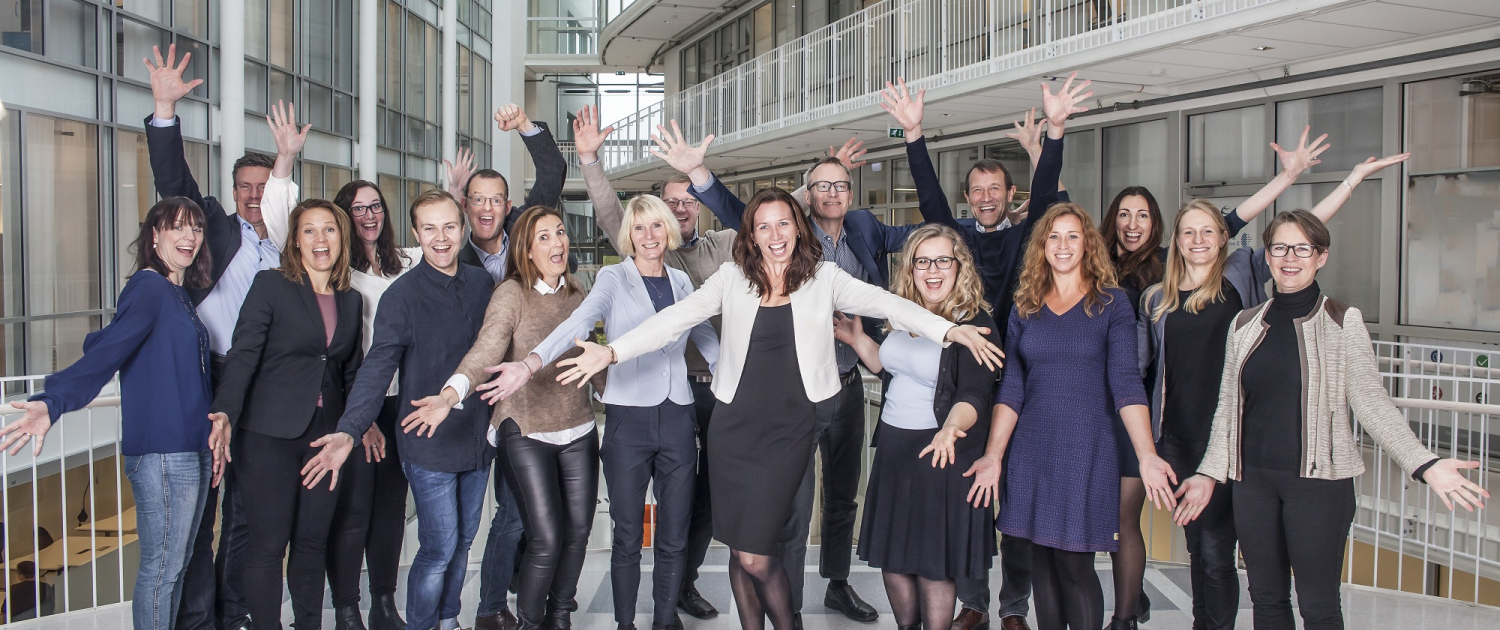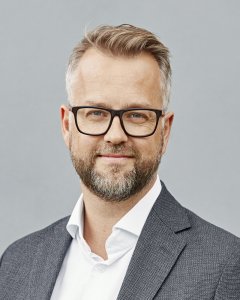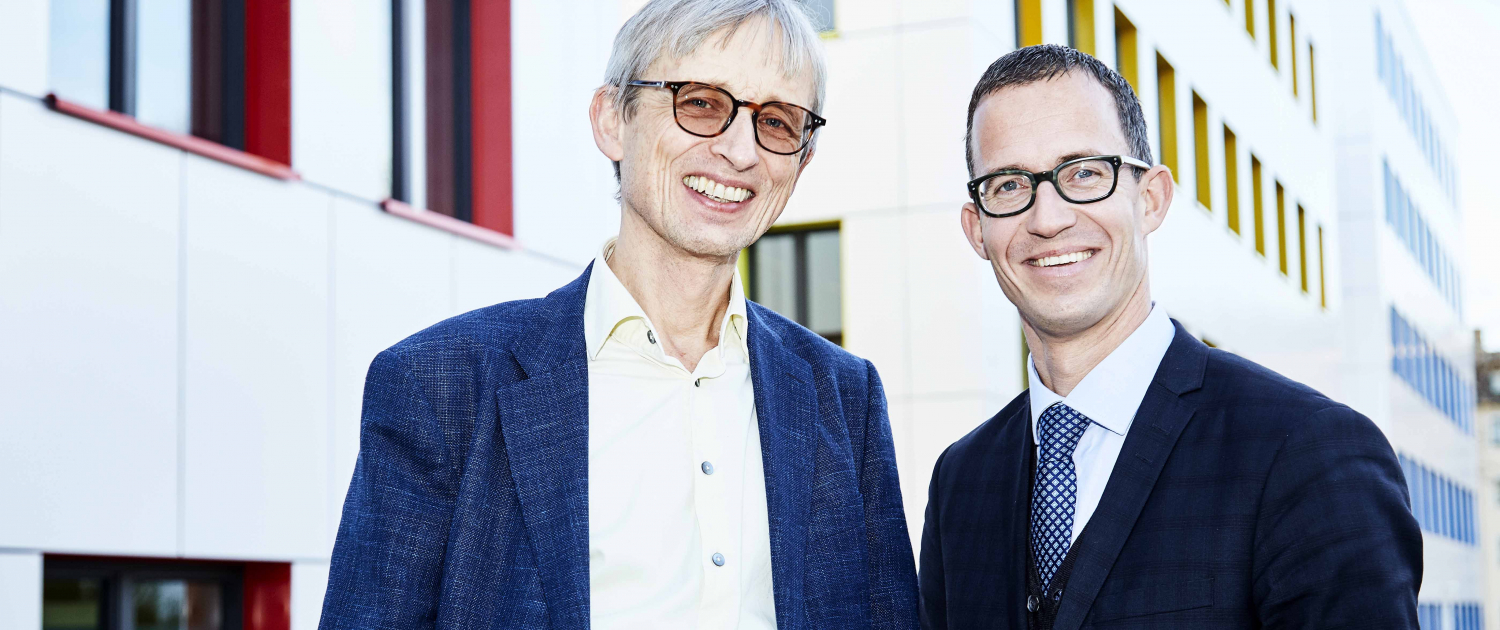
Together with our member Inven2, we wish to highlight the importance of facilitating clinical studies in Norway – in order to build a strong health industry and provide cancer patients with access to new, innovative treatments.
Read the original version of this article in Norwegian on Inven2’s website.
Inven2 handles agreements for clinical studies on behalf of the Cancer Clinic at Oslo University Hospital for most Norwegian companies that develop cancer treatments.
“This is an important contribution to the Norwegian health industry and shows that we are competing internationally,” said Siri Kolle, VP Clinical Trials at Inven2.
OncoInvent is one of the promising Norwegian cancer companies that run clinical studies at the Norwegian Radium Hospital, a part of Oslo University Hospital. They initiated two Phase I studies in May and June this year, on ovarian and colorectal cancer with progression to the abdominal cavity.
The disease progression to the abdominal cavity is what often kills these patients and there is no effective treatment today.
“The product we have in clinical development is called Radspherin®. Radspherin® is a radiopharmaceutical product. It emits alpha rays that effectively kill cancer cells and is gentle for the patient, since the radiation only reaches a couple of cells in diameter,” said Hélen Johansen Blanco.
Blanco is Head of Clinical Operations at OncoInvent and, as such, she is responsible for the company’s clinical studies. She has more than 20 years of experience with clinical studies from both big pharmaceutical companies like AstraZeneca and Celgene, and several biotech companies.
OncoInvent is the third of the four companies that serial entrepreneurs Roy Larsen and Øyvind Bruland have initiated. Algeta was the very first one and was sold to the global biopharmaceutical company Bayer in 2013 for the impressive sum of NOK 18 billion.
Read more about OncoInvent below FACTS at the bottom of this article.

Hélen Blanco, Head of Clinical Operations, OncoInvent. Photo: OncoInvent.
Close private-public collaboration
The overview from Inven2 shows eight Norwegian companies that are developing cancer treatments and have clinical studies at Oslo University Hospital at the moment. These are Targovax, PCI Biotech, Nordic Nanovector, Ultimovacs, Vaccibody, OncoInvent, BerGenBio and Exact Therapeutics. These companies are also members of Oslo Cancer Cluster.
What the companies have in common is that they are based on cancer research in Norway, either from academic institutions like a university or hospital, or they have been spun out of private companies.
“Oslo University Hospital has the expertise and feasibility to perform these types of complex early phase studies and is competitive internationally. This is an important prerequisite for Norwegian start-ups to be able to test their treatments in Norway,” said Siri Kolle, VP Clinical Trials at Inven2.
Local trials are a part of building a well-functioning ecosystem for the health industry in Norway.
“This also means that Norwegian cancer patients gain access to new and innovative treatments from Norwegian biotech companies long before the treatments reach the market,” said Kolle.
Kolle thinks that giving Norwegian companies the opportunity to test treatments locally should be a significant part of the Action Plan for Clinical Studies, which will be presented by the Norwegian Ministry of Health and Care Services before the end of the year.
In addition, some of these companies and other Norwegian pre-clinical stage companies, buy services from Oslo University Hospital.
“These services are important for the companies’ research and development, both in pre-clinical and clinical stage. The services include, among other things, pre-clinical studies, production, analysis and reports,” said Kolle.
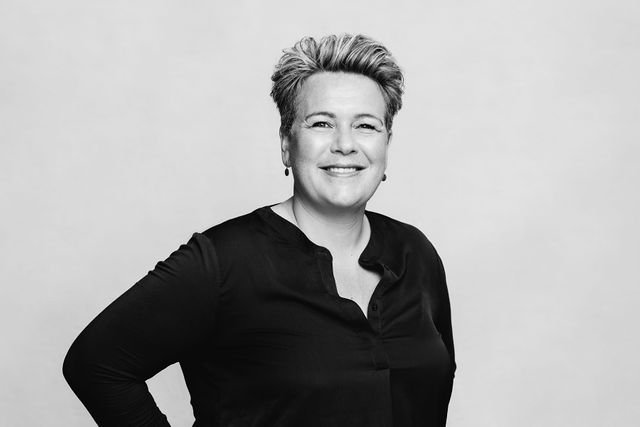
Siri Kolle, VP Clinical Trials at Inven2. Photo: Inven2/Moment Studio.
A professional organisation
Jon Amund Kyte is the Head of the Department for Experimental Cancer Treatment at Oslo University Hospital.
“During the course of 20 years, this has developed into a professional department that can perform high-quality clinical studies on behalf of both Norwegian biotech companies and the global pharmaceutical industry. We have quick start-up and good patient recruitment. Moreover, we emphasise patient security, documentation, and data quality. These elements are essential to perform clinical studies,” said Kyte.
The department consists of three units:
- The Clinical Cancer Research Unit at the Norwegian Radium Hospital, which is specialized in Phase I/II studies.
- The unit for clinical study nurses, who support the running of the academic departments. In other words, they support the doctors from the different cancer groups who lead the studies, who are also called main investigators or investigators.
- The “Clinical Trial Office”, which involves a project coordinator that performs all the administrative work for a clinical study, on behalf of the companies that require support and the investigators. This includes applications to the regional ethics committee, all internal agreements with the different hospital departments, agreements with Inven2, applications to the research council (Forskningsutvalget) at the hospital, etc.
“When we receive a request from a company who want to run a study, we contact an investigator in the relevant cancer group, to see if they can do the study. Then, the company goes to our Clinical Trial Office,” said Kyte.
Kyte said that they want to offer the companies a one-stop-shop. The system they have rigged around clinical studies is comprehensive.
“This rig saves both time and money for the company, which doesn’t need to call many different people at the hospital. At the same time, the responsible doctors, the investigators who will lead the study, are relieved from the administrative burden. It is then easier for the doctors to participate,” said Kyte.
Kyte said they are mindful of keeping their promises to the companies. They will rather decline a study if they can’t deliver all the company’s needs or they can’t recruit enough patients.
“We also offer more services to the small companies that are less experienced with clinical studies and that have less resources than the global companies,” said Kyte.
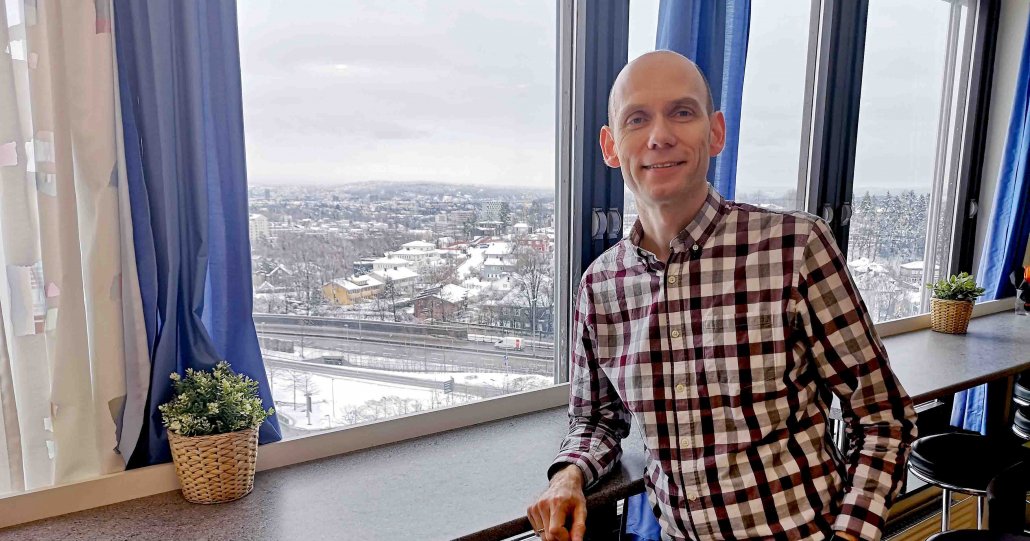
Jon Amund Kyte is the Head of the Department for Experimental Cancer Treatment at Oslo University Hospital. Photo: Sofia Linden
Norway needs to compete
The fact that OncoInvent can perform studies in Norway is important for the company. But it is not a matter of course. The biotech company is “born global” and the studies they run in Norway need to be on the same level, or better, than the clinical studies they run abroad.
“The following aspects are particularly important for us when we choose which locations to place our clinical studies: the quality of the clinical data, the implementation of the study, that the study is started quickly and that the clinical centre can recruit the number of patients they have promised,” said Blanco.
She is very pleased with the two clinical studies that OncoInvent have ongoing at Oslo University Hospital so far and is happy to place more studies there if this positive experience lasts.
“One of the studies we have on colorectal cancer with progression is at the national centre responsible for treating patients with colorectal cancer that has spread to the abdominal cavity. This is a centre with high recruitment of patients from the entire country and that performs the study at a high level. They have included four patients so far and the first dose level is confirmed safe for the patients. No patients have dropped out of the study after signing the consent forms,” says Blanco.
The last part is an important point. Blanco tells us that they thought some patients would drop out of the study after giving their consent. This is because there are very specific inclusion criteria in all clinical studies, but the patient must first give consent before any testing can be done. This shows that the centre, led by gastro surgeon Stein Larsen, knows the patient group very well, Blanco points out.
“In addition, to have a quick start up the contractual work is essential. The negotiation process with Oslo University Hospital has been relatively quick and simple,” said Blanco.
She still points out that there are some structural challenges with running studies in Norway, such as the lengthy application processes at the Norwegian State Medicinal Agency and the Regional Ethics Committee, compared to other countries, such as Singapore and USA. OncoInvent’s experience is that Norway has been the quickest country to start up studies in so far.
“Compared to my experiences from the global studies that I have been responsible for, Norway has traditionally been relatively high in terms of cost and then we expect high quality data, like they deliver in for example Belgium or Germany. However, cost is not always in proportion to quality,” says Blanco.
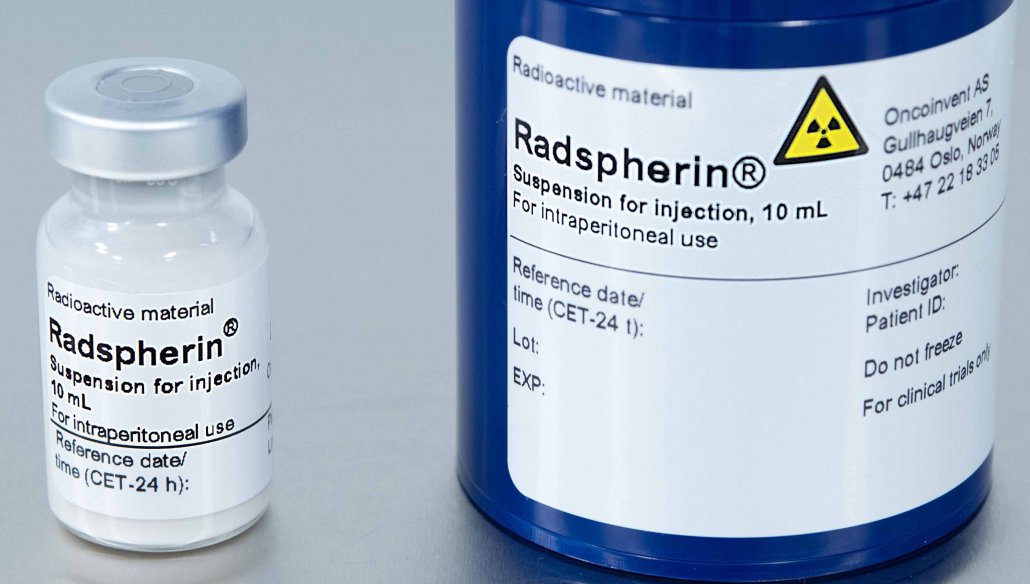
Radspherin® is a radiopharmaceutical product. It emits alpha rays that effectively kill cancer cells and is gentle for the patients, since the radiation only reaches a diameter of a couple of cells. Photo: OncoInvent.
Good at quick recruitment
Vaccibody and OncoInvent are proof that the Department for Experimental Cancer Treatments can start studies quickly.
OncoInvent publicised in May and June 2020 that the two phase I studies had begun with their first patient and Vaccibody advertised in July 2020 that its international phase II study of the DNA-based HPV vaccine in combination with a check point inhibitor from Roche also had begun.
In an opinion piece in the Norwegian medical newspaper Dagens Medisin, Kristina Lindemann, Staff Specialist at the Department of Gynaecologic Cancer and Head of Research Group for Gynaecological Oncology, wrote:
“We think it is great that Oslo University Hospital (OUS) was the first site and began with the first patient in this international study for patients with advanced cervical cancer.”
The reason they are quick at recruiting patients is because the Department for Experimental Cancer Treatments runs all applications and approval processes in parallel.
“We have checked and prepared the staff who will perform the study in advance, so that everything is in place when the company begins the study,” said Kyte.
The department gives their employees in-depth training, besides what has already been covered in the course “Good Clinical Practice” and have internal routines to secure good data quality.
When the clinical studies at Oslo University Hospital were stopped because of the corona pandemic in March, they were quickly up and running again because of the good internal routines.
“We never promise more than we can keep. If we can’t deliver a study, we may lose all future studies from that company or in that cancer type, and we don’t want to risk that. Our good reputation is all we have,” said Kyte.
Big potential for studies
Even if many things work well at the Clinical Trials Unit that Kyte heads up, Kyte wishes that clinical studies were a part of a more streamlined system at Norwegian hospitals.
“Clinical studies should be an integrated part of ordinary patient treatment, with dedicated specialists who have time set aside to work with clinical studies. Now, we need to obtain the price and capacity from each department of the hospital for the services we need for the studies. This process is both time-consuming and risky. If one department says no, then we must decline the study and if we are one investigator short, then the study cannot be run,” Kyte explains.
Kyte thinks that the streamlining of the processes should be assigned through documentation from the Ministry of Health and Care Services to the hospitals. This means that when the button “clinical studies” is pushed, it is just as binding for the hospital to complete as any other patient treatment.
“We run about 70 clinical studies at our hospital, this includes both industry studies and academic studies, but we have a much larger potential than this. We are a part of a ‘Comprehensive Cancer Center’ and have access to many cancer patients and competent cancer researchers at the hospital. We are very motivated to drive the interaction between research, business development and patients, that clinical studies represent,” said Kyte.
FACT
OncoInvent
- OncoInvent was established ten years ago by serial entrepreneurs Roy Larsen and Øyvind Bruland. They are also behind cancer companies Algeta, Nordic Nanovector and newly established Nucligen. Tina Bønsdorff, Head of Research in OncoInvent, and Thóra Jónasdottir, board member in OncoInvent, also helped to establish the company in 2010.
- Radspherin® is the main product from OncoInvent and is a radiopharmaceutical. This means it is a radioactive pharmaceutical that can kill cancer cells. Radspherin® consists of calcium carbonate particles marked with the radioactive isotope Radium-224, which is an alpha-emitting particle.
- OncoInvent is in clinical development, with two phase I studies in Norway for the treatment of cancer metastasis in the abdominal cavity, from ovarian and colorectal cancer.
- The radiation that Radspherin® emits is short and can therefore kill the cancer cells in the abdominal cavity more effectively without harming other parts of the body.
- OncoInvent has their own production facilities for Radspherin® at their headquarters in Nydalen in Oslo, which is unusual for a small biotech company.
- The company consists of almost 30 employees as of the end of this year.
Read more at OncoInvent’s official website
The Department for Experimental Cancer Treatment and Research Support
- The main duty of the department is to contribute to more and better patient-focused research by facilitating for and implementing clinical studies.
- It is led by Jon Amund Kyte.
- It is a part of the Department for Cancer Treatment at Oslo University Hospital.
- It consists of about 56 people connected with the department.
- It runs about 70 clinical studies today, both from industry and academia.
- It has studies in medical treatments, gene therapy, cancer vaccines, palliative treatments, radiation therapy, surgery and diagnostic procedures.
- Read more about the work in the department in this interview with Jon Amund Kyte from Pharma Boardroom.




